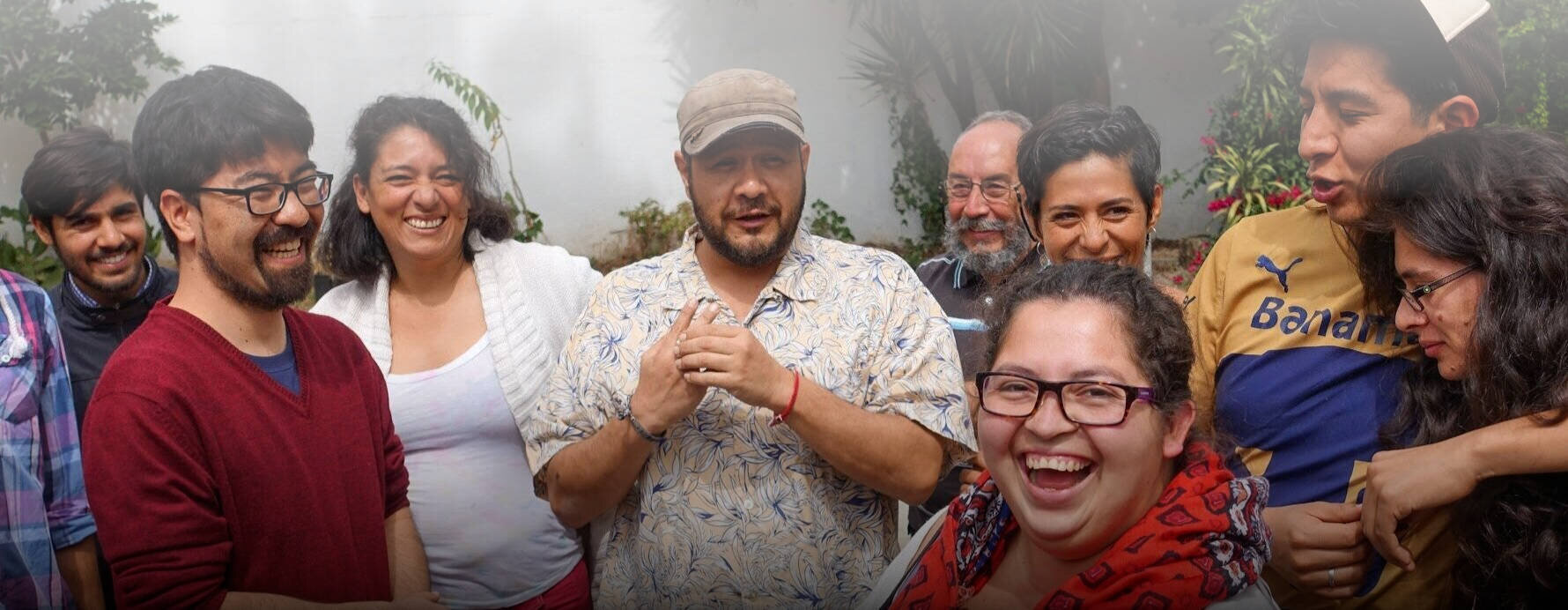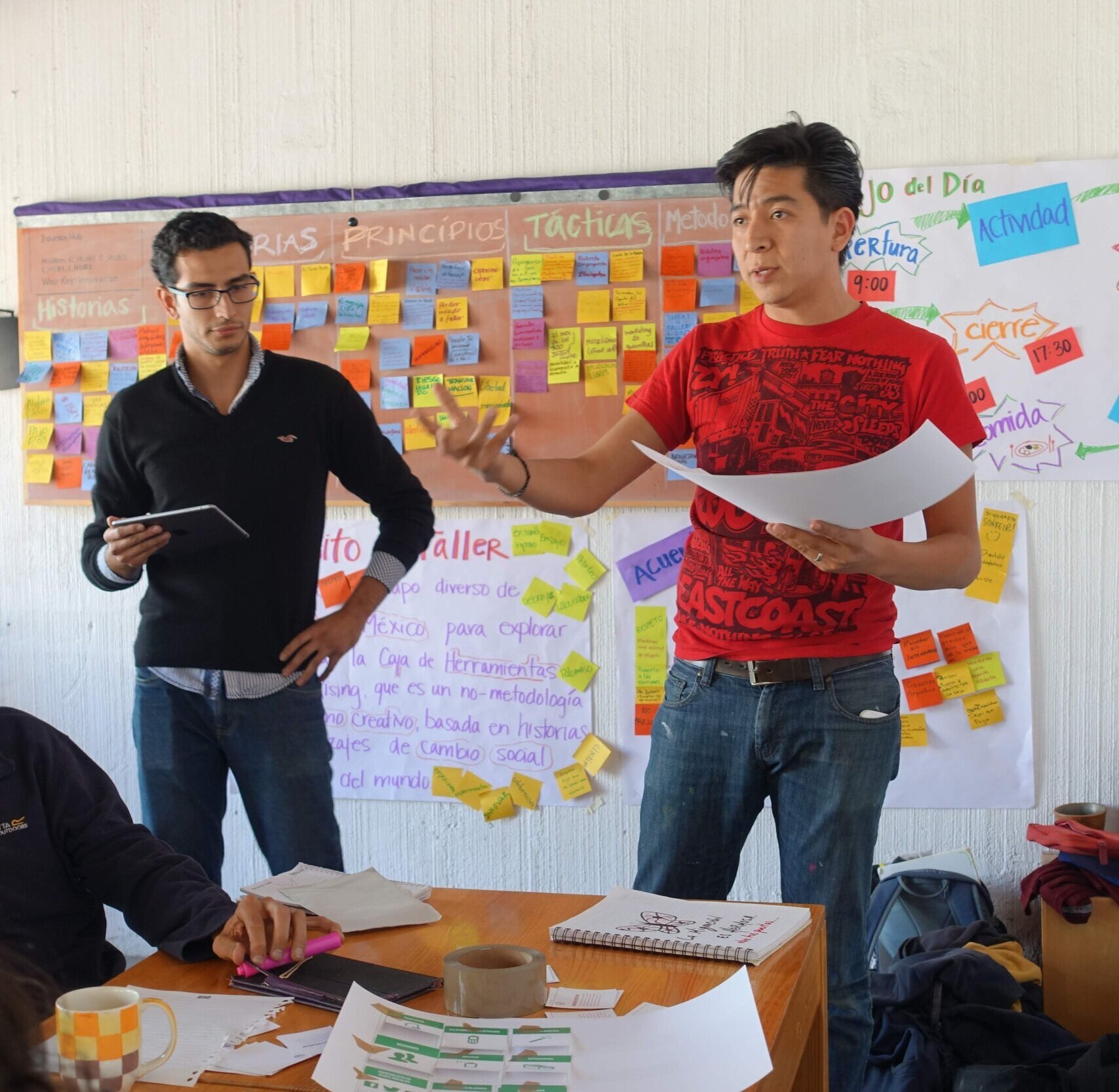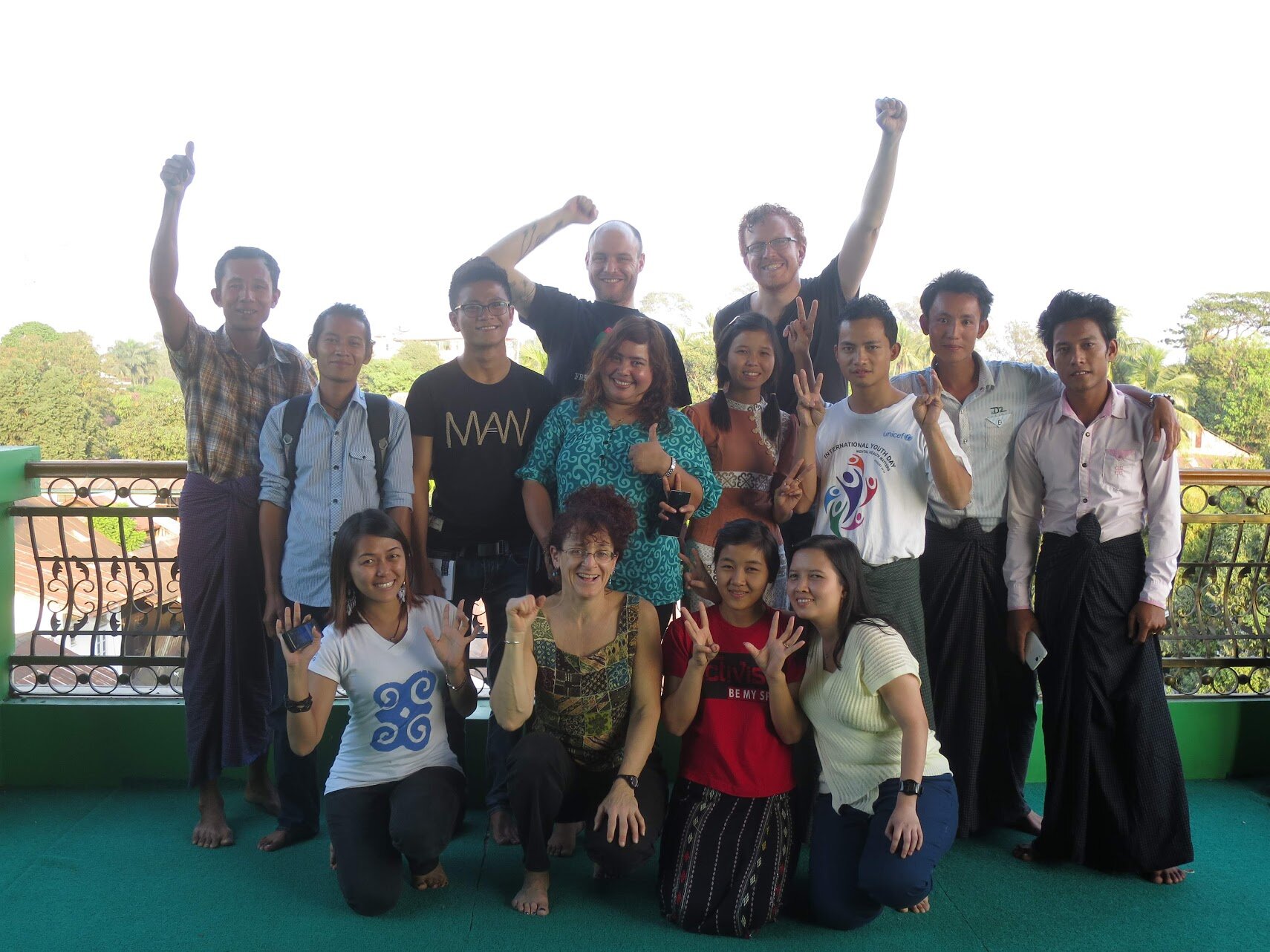
BEAUTIFUL RISING:
A Global Story
Beginning in 2014, Beautiful Trouble partnered with ActionAid International and frontline social movement activists across the Global South to develop a toolkit of social movement resources by and for global changemakers.
The lessons, innovations, insights and stories that emerged from that process were published in the 2017 book Beautiful Rising: Creative Resistance from the Global South, and formed the backbone for the 2018-2021 overhaul of the online Beautiful Trouble toolkit as it now stands. Beautiful Rising has inspired many other compilations throughout the Global South, from the new Beautiful Trouble Pan-Afrika Edition to a Myanmar coup response edition compiled using the My Tools feature of this site.
Below is our account of that process and the ways in which it continues to infuse our work, drawing from the introduction to the Beautiful Rising book.
Beautiful Rising is an innovative partnership between ActionAid and Beautiful Trouble, funded by the Danish International Development Agency. ActionAid is an international organization based in Johannesburg that works with over 15 million people in 45 countries for a world free from poverty and injustice.
Inspiration
This toolbox was inspired by the Beautiful Trouble book and website. The scope has been expanded to involve a more diverse group of activists as both makers and users of the toolkit.
Definition
We’ve conducted six ‘jam sessions’ around the world with diverse groups of activists to better understand the problems they’re facing and generate locally relevant content for the toolbox.
Prototyping
In each jam session, low-fidelity prototypes of the toolbox were presented to activists to take apart and put back together based on their needs and challenges.
The Beautiful Rising Story
The following is an excerpt from the introduction to Beautiful Rising.
Over a hundred organizers from five continents have contributed to this Global South-centered toolbox, many of them through face-to-face jam sessions we held in Yangon, Amman, Harare, Dhaka, Kampala, and Oaxaca in 2015 and 2016. The stories they shared include the Ugandan organizers who protested corruption with Yellow Pigs in Parliament, the Burmese Students’ Long March against undemocratic and overly centralized education reforms in 2015, the Lebanese Honk at Parliament campaign against politicians who had clung to power long after their term had expired, and many others.
What emerged from this process was a global network of frontline organizers, theorists, and strategists documenting innovations and analysing common challenges. Among these challenges, the issue of the NGO-ization of resistance — the ways in which the rapid proliferation of non-governmental organizations under neoliberalism has inhibited popular and democratic struggles — quickly revealed itself as a problem faced by activists working in vastly different contexts across Asia, Africa, and Latin America. By naming it, changemakers were able to identify a key pattern across their various struggles and thus better target neoliberalism as a global repressive ideology. To counter this destructive force, activists identified a need for solidarity not aid — both south-south solidarity, and a rebalancing of the power dynamics of north-south solidarity.
The growing ferocity of state violence is another challenge faced by activists across the Global South. In response, activists shared several principles that guide their work and help to ensure their safety, such as seeking safety in support networks in order to deter state and paramilitary violence, and jail solidarity to deter abuse and shorten the detention of imprisoned activists.
While many common global challenges were revealed, other challenges seemed particular to a country or region — for example, the use of baltajiah (thugs) by authoritarian regimes in the Middle East to repress rising movements. Though it’s called different names in different countries (in Jordan and Palestine, sahijeh or “clappers”; in Egypt, baltajiah or “axes”; in Syria, shabiha or “ghosts”), a common political formation was identified by activists across the region: a marginalized group that are paid to support the state apparatus in key moments by violently disrupting movements seeking change. One of the most famous manifestations of this phenomenon is the Battle of the Camel, in which camel riders attacked and killed protesters in Egypt’s Tahrir Square in 2011.
In the process of documenting the creative methods used by movements operating in politically repressive environments, we often uncovered similar patterns of creative response that had very different expressions from country to country. Take, for example, clandestine leafleting, a way to share information with the public when it’s too dangerous to do so openly). In Syria, activists sent a cascade of slogan-marked ping-pong balls bouncing through the streets, and in Myanmar (Burma) they wafted a fleet of leaflet-laden hot-air lanterns across the city.
Throughout our workshops, campaigners repeatedly called for better tools to facilitate strategic thinking. To address this need, contributors documented the strategic frameworks and hands-on exercises their organizations use to assess their situation and plan their campaigns. The best of these are collected in the methodologies section.
We hope this now fully integrated toolbox, and the larger project of which it is a part, will serve as an evolving body of knowledge for veteran social change practitioners, as well as an effective entry point for newcomers into the incredible creativity with which social movements are building resistance across the Global South. Since the platform launched online, more and more people have been getting in touch to contribute ideas, share lessons, request trainings, strategize local campaigns, and build a stronger global network of solidarity among changemakers. We hope this will only continue in the years ahead.
Finally, we’ll leave you with choice words from novelist and activist Arundhati Roy, from which this work draws much inspiration:
Our strategy should be not only to confront Empire but to lay siege to it. To deprive it of oxygen. To shame it. To mock it. With our art, our music, our literature, our stubbornness, our joy, our brilliance, our sheer relentlessness — and our ability to tell our own stories. Stories that are different from the ones we’re being brainwashed to believe.
The corporate revolution will collapse if we refuse to buy what they are selling — their ideas, their version of history, their wars, their weapons, their notion of inevitability.
Remember this: We be many and they be few. They need us more than we need them.
Beautiful Rising Values
Open collaboration and distributed leadership
Beautiful Rising is written by and for frontline activists — particularly youth, women, indigenous peoples, and others who face discrimination on the basis of their sexual orientation, gender identity, ethnicity, class, race, or religion. Guided by the needs of the movements and activists we work with, we seek to prioritize local voices and local leadership at every stage.
Undoing power and privilege
We commit to working to unravel unequal power relations rooted in historical and structural violence, which can poison well-meaning efforts originating from places of privilege.
People power and international solidarity
We stand in solidarity with the efforts of social movements to defend fundamental rights and exercise grassroots democratic power. We seek to facilitate learning across activist networks and struggles for liberation, and we commit to practicing anti-oppression and south-south solidarity in all aspects of our work. We stand in opposition to efforts by governments, corporations, and NGOs to suppress or co-opt social movements, whether through direct suppression, through the NGO-ization of resistance, or through so-called “democracy promotion” efforts that seek to use popular unrest to undermine grassroots democracy.
Creativity in the face of violence
We seek to share tools that amplify the creativity, security and effectiveness of social movements. Though our focus is on achieving social change through movement building and nonviolent direct action rooted in love and solidarity, we do not presume to dictate or police the range of acceptable responses to any given situation.
Enriching the commons while protecting privacy
We use and contribute to open-source software initiatives whenever possible, and our materials are published under a Creative Commons Attribution-NonCommercial Share Alike 4.0 International License. We seek to ensure that the toolbox is accessible to all, regardless of limitations of financial resources, bandwidth, language, technology, and security. As much as possible, we use communication and collaboration tools that protect contributors’ privacy.
Disclaimer
The Beautiful Rising team claims no responsibility for the victories achieved, the defeats suffered, nor any unintended consequences that may arise from use of the toolbox. Take risks, but take care!.











